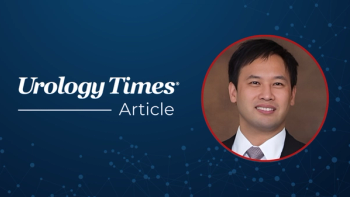
Priorities reflect systemic change, shifting centers of power
"Surveying the landscape as leadership of the U.S. House of Representatives swaps parties and governorships creep toward a 50/50 partisan balance, several opportunities to affect positive change stand out," writes the AACU's Ross E. Weber.
Based on a partnership with Urology Times, articles from the American Association of Clinical Urologists (AACU) provide updates on legislative processes and issues affecting urologists. We welcome your comments and suggestions. Contact the AACU government affairs office at 847-517-1050 or
Within the health care and medical practice policy arenas, the scope and complexity of the issues affecting the urologic community may seem overwhelming. Mergers and acquisitions. Access to life-affirming care and the definition of "quality." Administrative burdens and defensive medicine. Physician training and patient safety.
Urologists are fortunate to have several organizations taking aim at each. The AACU, for one, is comprised of dedicated leaders who take an active role developing and promoting solutions that positively impact the urologist's patients, practice, and profession. Surveying the landscape as leadership of the U.S. House of Representatives swaps parties and governorships creep toward a 50/50 partisan balance, several opportunities to affect positive change stand out.
Federal, state prostate cancer initiatives
On the prostate cancer front, there are ongoing efforts to provide access to screening and improve the reliability of biopsy test results. Although the U.S. Preventive Services Task Force recommendation for prostate cancer screening improved in 2018, a fundamental problem with the composition of the Task Force remains; the members have no expertise in the related conditions and they seek no outside advice on literature review.
Also from the AACU:
Therefore, the AACU continues to believe that passage of the USPSTF Transparency and Accountability Act is crucial to the health of all Americans. Former U.S. Representative Marsha Blackburn championed this legislation as a member of the House. With support from UROPAC-Urology's Advocate on Capitol Hill, Blackburn's campaign for the Senate was successful. In 2019, the AACU will work with the bill's remaining sponsor, Rep. Bobby Rush (D-IL), to re-introduce the legislation for consideration.
The State Advocacy Network, meanwhile, will strongly support legislation across the country that requires insurers to cover prostate cancer screening. Where testing is already a mandated benefit, moves should be made to make that coverage cost-free, along the lines of a bill in New York State that was signed by Gov. Andrew Cuomo late last year. An important ancillary effort to improve the accuracy of prostate biopsies will be undertaken through support of federal legislation requiring Medicare coverage for DNA Specimen Provenance Assay testing of any positive biopsy result. According to U.S. Rep. Larry Bucshon, MD (R-IN), "it is estimated that 1.3% of patients are erroneously told they have prostate cancer when they do not... [DNA testing will] prevent invasive medical procedures, and save taxpayers money."
Next:
Outside of this area, there are important ways urologists can stand with and for patients. Pediatric urologists, in particular, must combat untruths spread by organizations that want states to tie patients, parents, and providers' hands when it comes to management of differences in sex development. In 2018, those groups pushed for state policies that expressed opposition to early surgical intervention in any and all cases, including adrenal disorders that require swift action. The Societies for Pediatric Urology is therefore developing a group of urologists located in each state capital to educate lawmakers and testify whenever legislative committees consider this complex issue.
Urologists are also engaged on patients' behalf in matters affecting insurers' unmanageable utilization management techniques and opaque drug pricing practices. Oklahoma City's Charles McWilliams, MD, spoke to his state's incoming insurance commissioner about transparency and regulation of pharmacy benefit managers to give patients a chance of knowing whether the prices they're being charged reflect manufacturer discounts and rebates. The AACU also participates in the American Medical Association's #FixPriorAuth campaign, which aims to minimize patient and provider burdens related to prior authorization.
Read:
President Trump and Congress, meanwhile, offer contradictory paths. On one hand, urologists are prepared to oppose regulations that allow Medicare Advantage plans to impose more stringent prior authorization and step therapy requirements. On the other hand, the AACU stands in strong support of state and federal legislation such as the last Congress' Restoring the Patient's Voice Act, which addresses fail first/step therapy. That bill required employer-sponsored health plans that employ step therapy to implement a clear process by which the physician can request an exception to the requirement.
Work force a top priority
Patients are also well served by a well-trained, engaged and autonomous physician work force. Urologists are therefore committed to addressing the bottleneck between medical school and residency. First and foremost, increasing the cap on Medicare funding for graduate medical education remains a priority. This avenue has been the focus of legislation introduced several times over the last few years. The Resident Physician Shortage Reduction Act increases the number of residency slots nationally by 15,000, with one-half being designated for training in a shortage specialty. Unfortunately, of the five lawmakers who were original sponsors of the most recent version of that legislation, only one remains in Congress, Sen. Chuck Schumer (D-NY).
There are also opportunities to increase funding for physician training via the Veterans' Administration and state government. States allocate money to GME directly in their budgets, as well as through their Medicaid program. According to an
As insurance companies seek loopholes to deny justified reimbursement and more physicians transition to employment, maintaining professional autonomy requires greater attention from advocacy organizations. The AACU, for instance, supports state legislation that proactively decouples licensing, credentialing, and privileging to maintenance of certification, as well as efforts to ensure that services provided during the credentialing process are reimbursed according to the agreed-upon schedule.
Likewise, the organization promotes ideas like an employed physician's bill of rights, as described in
As for influencing conversations in Washington, the AACU works closely with UROPAC to facilitate introductions and educate candidates and their campaigns about the issues impacting urologists and the urologic community.
Newsletter
Stay current with the latest urology news and practice-changing insights — sign up now for the essential updates every urologist needs.






